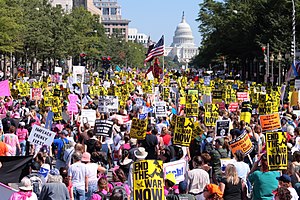There is a movement afoot to boycott Amazon, and it even has its own online petition at ThinkBeforeYouClickCA.org. This in fact is a battle of petitions, with the boycotters working online and Amazon, ironically, gathering signatures at bricks-and-mortar venues.
How big the movement will get or whether it will have any impact remains to be seen, but at a minimum it represents a new and unexpected element in the world of publishing.
What’s at issue is the collection of sales tax.
The background: In states (this is purely a US matter) and municipalities where there is a sales tax, anyone who steps into a bricks-and-mortar store expects to pay sales tax anywhere in the range of 5-9%, money that is then used for various governmental purposes. The sales tax regime is a crazy quilt, with the cost of a product sometimes literally being different when you cross the street into a neighboring tax jurisdiction. Online merchants have been spared the collection of the tax unless they have “nexus” — physical facilities in the state. It’s clear that this situation creates an unbalanced marketplace, with Barnes & Noble, for example, with physical nexus in many states, having to collect the tax, but Amazon, with nexus in very few states, collecting little tax.
It’s hard to be a merchant when your online competitor can charge 8% less on everything they sell.
Individuals are supposed to pay the tax themselves if the online merchant doesn’t collect it, but few people do. I am one of the few that comply — keeping a spreadsheet open and entering each purchase with the sales or “use” tax required under the law — and I must tell you that it is a royal pain in the neck. But I do it because I am a civic-minded chump, knowing full well that this is a regulation honored more in the breach.
The state of California, where I reside, has now passed legislation that would require Amazon to collect the tax. Amazon has taken the extraordinary action of trying to overturn the legislation by pressing for a referendum on the subject. People with petitions are out looking for signatures now.
I should provide some background on how democracy is practiced in the richest state in the richest country in the world. Like citizens everywhere in the US, Californians support state democracy and majority rule, going to the ballot box every year to send officials to the capital in Sacramento. Unlike many other states, however, California has improved the system by insisting that some measures require a supermajority, thus broadening the base of power by supporting minority rule as well. And in the piece de resistance, fearing that some work might be left undone — or done — even with majority and minority rule at work in our public affairs, we Californians also support a state referendum process, whereby the people can vote directly on many issues, bypassing the legislature. This is how Arnold Schwarzenegger became governor (through the back door when Governor Gray Davis was recalled) and how Howard Jarvis pushed through Proposition 13, which severely restricted the state’s ability to hire teachers, put books in libraries, and fix potholes. When I described the California style of democracy to an Eastern European publisher I know, a look of nostalgia appeared on her face for the era of Soviet totalitarianism.
It is in the tradition of Jarvis that Jeff Bezos now stands. The proposed referendum, should it get on the ballot, would make it illegal to force online merchants to collect sales tax.
This has gotten some people hopping mad. Hence, the boycott.
It’s a shame it has come to this. Amazon is truly one of the world’s great companies. It is difficult to imagine the world of books without it, despite the fact that it has able competition from Barnes & Noble, which is still the largest US bookseller when print and electronic books are combined. And there are other meaningful venues: Powell’s, Google E-books, the Apple iBookstore, and literally thousands of outlets in the physical world, from independent bookstores to mass merchandisers to drugstores. The book business is an amazing thing; in 2010 about 2.7 billion books were sold in the U.S., giving the lie to anyone who says that the book is dead and that people don’t read. In this world, Amazon is the rising colossus: innovative, technologically amazing (my Eastern European friend pronounces the name “a-MAYZ-on,” thinking the name comes from “amazing”), touching all points of the value chain, from self-published books to college texts. There is nothing Amazon cannot do except collect taxes.
When I first heard rumblings about a boycott, I began to ponder what it would mean to comply. It would be very hard. My professional life is so bound up with Amazon that I don’t know how to extricate myself. Could I in good faith not tell a client to avail itself of Amazon’s Cloud-hosting service? Could I tell my own kids not to look for their college textbooks on Amazon? How could I justify to a client not including Amazon from a list of distributors of e-books? Or do I tell an author of long out-of-print scholarly monographs not to consider Amazon’s print-on-demand operation? And this does not include the services that Amazon may yet get into. For example, the horsey technology now used by journals publishers for author submissions, peer review, and hosting would be child’s play for the engineers at Amazon to improve upon. How many times have I told clients that Amazon’s technology and interfaces represent the standards that their own services must rise to? A world without Amazon would be a diminished one.
For scholarly publishers, working without Amazon may be a nonstarter. Amazon’s market share varies by region, format, and subject area, but for scholarly books it reigns supreme. I happened to gather some data on Amazon’s role in the university press world a couple years ago. At that time, Amazon constituted about 25% of press revenues, a figure that has surely risen since then. Some presses reported that Amazon was almost half of their total volume.
The gathering of signatures for the referendum is proceeding apace. A friend of mine, who lives in Berkeley, told me of being accosted by someone brandishing an Amazon petition. She should sign it, he said, because we all have to stick up for the little guy. Amazon is the little guy? My friend asked some questions and elicited a series of illogical and blatantly false statements. Finally, the petition-gatherer pleaded with her to sign, declaring that he was on Social Security and needed the $3 per signature that the petition’s sponsor paid. She signed. We now know the price of the California style of democracy.
Even considering the boycott opens up other, disturbing thoughts. Would Amazon retaliate? Amazon has been known to behave aggressively toward publishers that have displeased them, removing the “buy” buttons from publishers’ titles — even while keeping the titles in the database, where a Google search will almost always bring a potential customer — when the publisher did not submit to Amazon’s demands. And this question of retaliation makes this not only a question for placard-carrying boycotters in Berkeley but for publishers in general and perhaps the society at large. Should any company be able to intimidate someone who voices a lawful protest?
The boycott of Amazon made me think of Siva Vaidhyanathan and his book, ”The Googleization of Everything.” Like Amazon, Google touches everything, and it makes you wonder if these companies should operate outside the regulatory environment. This is not a matter of Amazon or Google being “too big to fail” but of their being too intertwined to extricate. Of course, this is not the 1960s; today the genius of the world is not Berkeley but the economics department of the University of Chicago. Calling for regulation of industry as an assertion of the will of the people seems awfully remote. The market will tell us what is best for us.
Still and all, as I ponder this situation and the wild-eyed young men who asked me to sign one of many petitions in my local downtown area the other day, I hear the strains of Thunderclap Newman’s “Something in the Air.”
A great song.
Should I buy it from Amazon?
Discussion
11 Thoughts on "The Amazon Boycott — Power, Taxation, Big Companies, and Intertwined Economies"
California is so much fun to watch, yet sometimes sad too. But if they are trying to overturn the nexus standard legislatively then this is a dangerous precedent and Amazon is right to fight. I do not support boycotting a company for taking responsible action. What reasoning is behind the boycott?
Consider, however, that even when there is nexus, Amazon tries to get around it, as it is doing in Texas where Amazon runs a warehouse in Irving but insists it is not subject to state tax because the warehouse is owned by a subsidiary. The state comptroller disagrees and is demanding payment of over $240 million in back taxes. Interestingly, Governor Perry has supported Amazon in this fight against his own comptroller presumably because Amazon threatened to close the facility down and let 119 employees go. However, I pointed out that many more employees are losing their jobs in Texas because of the closure of Borders’ many stores in the state and it hardly seems fair to penalize those employees when Amazon isn’t playing on a level field as far as sales tax is concerned. I would have no trouble signing a boycott petition. Amazon’s tactics of intimidation (such as its threat to delist any publishers that did not use BookSurge as their POD vendor) are heavy-handed and despicable.
Note that Amazon does have a physical presence in California as well:
https://secure.wikimedia.org/wikipedia/en/wiki/Lab126
Welcome to New York, circa 2008. NY was the first state to impose sales tax on Amazon, and interestingly, Amazon never dumped NY affiliates and has been collecting sales tax and delivering it to NY for the last 3 years. This is because they need one state where they let the taxation happen in order to challenge it in court:
http://articles.latimes.com/2011/jul/19/business/la-fi-amazon-taxes-20110719
Between the sales tax reducing Amazon’s price advantage and some of their business practices that I find problematic, I’ve greatly reduced Amazon from my shopping rounds. B&N matches Amazon’s price on most books and offers the same free shipping with a $25 order. Better yet, instead of waiting a week to ship the books out, they ship them immediately. eMusic offers better prices for music and for many other items, there’s usually someone out there matching or beating Amazon’s price.
Amazon does have great advantage in convenience, having everything under one roof and having one’s credit card and shipping info already available. Then again, WalMart does the former and I don’t shop there either.
I’m finding myself more and more seeking out the local independent merchant and spending my dollars there. It may be futile, but I like supporting the local economy, and there are times when I need something right away. If the locals go away, I lose this convenience.
Why didn’t your friend simply give the petitioner $3 instead of signing a petition it sounds like she didn’t agree with? Just because a company is big doesn’t mean it should be exempt from things like taxes and the rules its competitors must follow. (In fact, being bigger brings more responsibility and should not entitle it to less.) Amazon is NOT everywhere and it is the misunderstanding that we can’t live without it that can be very dangerous.
Amazon needs to be on a fair playing ground with all other companies. Let the free market prevail. Amazon is skirting around the law and doing everything they possibly can to continue not collecting the tax. It is not that big of deal Amazon. That small percentage will not keep me from buying, but your ethics might!
On the contrary, Bill, as Chris Feola points out below, it looks like CA is trying to change the law and Amazon is resisting. If so then it is their right and duty, in our advocacy based system. Moreover, they will be doing it for the online sales industry, not just themselves, so the fair playing field issue does not arise.
Hey Joe,
An important thing to remember here is that this has already been litigated to the US Supreme Court, and the states lost in 1992. Since then, they have been trying to find “creative” ways to do it anyway. Hard to blame Amazon for fighting attempts to force them to do what the US Supreme Court has already said was illegal. Here’s the decision: http://law.cornell.edu/supct/html/91-0194.ZO.html
Hope all is well with you and yours.
cjf
Yes, but note that the Court explicitly recognizes Congress’s power to write legislation that will interpret the Commerce Clause’s requirements differently, and I believe there are efforts under way in Congress to do just that. Of course, the Court’s decision in no way gets Amazon off the hook for the situation in Texas.
Truth. Interesting, though, that these efforts have stalled repeatedly in Congress — which has the power, according to the Court — while legislatures such as California’s — which don’t — keep passing these end-arounds.
I actually doubt Congress will do much for the foreseeable future for one particular reason — no state wants Congress anywhere near anything that smells like VAT.
cjf
I would have thought the ‘little guy’ to be the person buying books from Amazon, and not Amazon itself. Amazon merely calculates (a HUGE task to be sure) the tax to be paid and presents the final figure to the ‘little guy’, and he or she would be the person paying. In Joe’s case, Joe would be paying to Amazon, instead of keeping tabs himself. i.e Joe is also the ‘little guy’.
So are the students who buy textbooks, etc. They are all the ‘little guys’.
Amazon doesn’t lose any money other than decreased demand due to price increase.




